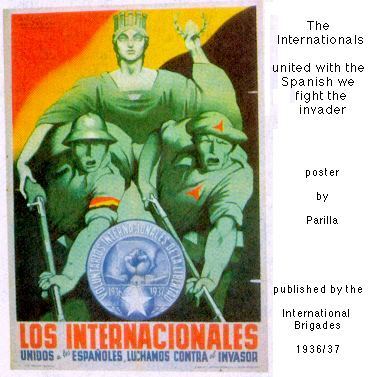
result of a military overthrow of the republican government, 1936 - 1939.
Spain's industrial development was lagging behind the larger countries of Europe, and at the beginning of the 20th century the feudal aristocracy, supported by the catholic church, still maintained significant power. The conflict between workers and the ruling classes sharpened in the 1930s. General strikes flared up during 1934, and an uprising of the miners of Asturia was violently suppressed by troops under the command of General Francisco Franco.
A Popular Front, formed by several parties of the left (socialists, communists and anarchists) won the elections of 16 February 1936 and formed a new government. A coalition of church, landowners, military and large business immediately prepared a military coup, which began on 17 July. But the forces on both sides were of equal strength, and the "Nationalists", as the supporters of the coup called themselves, could only achieve control of Spanish Morocco, the Canary Islands, the Balearic Islands except Minorca, and some territory in northern Spain. A ferocious civil war ensued and dragged on for three years.
The international situation at the time was characterized by the rise of fascism in Germany and Italy and the growing strength of the Soviet Union, which was consolidating itself and supporting revolutionary movements in other countries. Under such circumstances the Spanish Civil War took on an international dimension. The Nationalists received support from the fascist governments of Italy and Germany, while some 40,000 volunteers from all over Europe and from the USA fought as "International Brigades" on the side of the Republicans, supported by some 20,000 international volunteers in medical and auxiliary units.
By March 1939 the Nationalists, headed by General Franco, had driven the Republican troops into France and occupied Madrid. Franco established a fascist dictatorship that lasted until his death in 1975. The republican government, headed first by the Socialist Francisco Largo Caballero and from 1937 by the Socialist Juan Negrín, continued in exile until 1945.
Hitler used the Spanish Civil War as an opportunity to test the readiness of his war machinery. The bombing of the Basque town of Guernica by the German air force in 1937, one of the worst aerial bombings of a civilian population in history, led Picasso to paint his famous mural Guernica.


Pablo Picasso: Guernica. (1937)